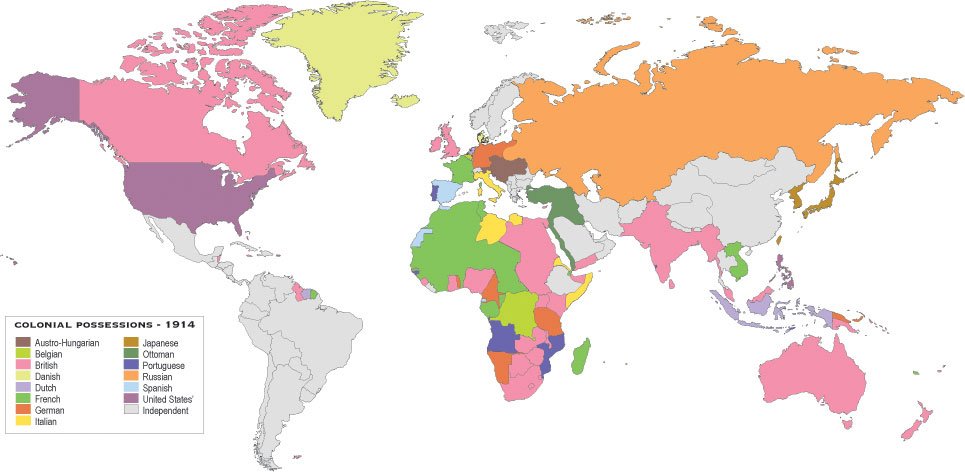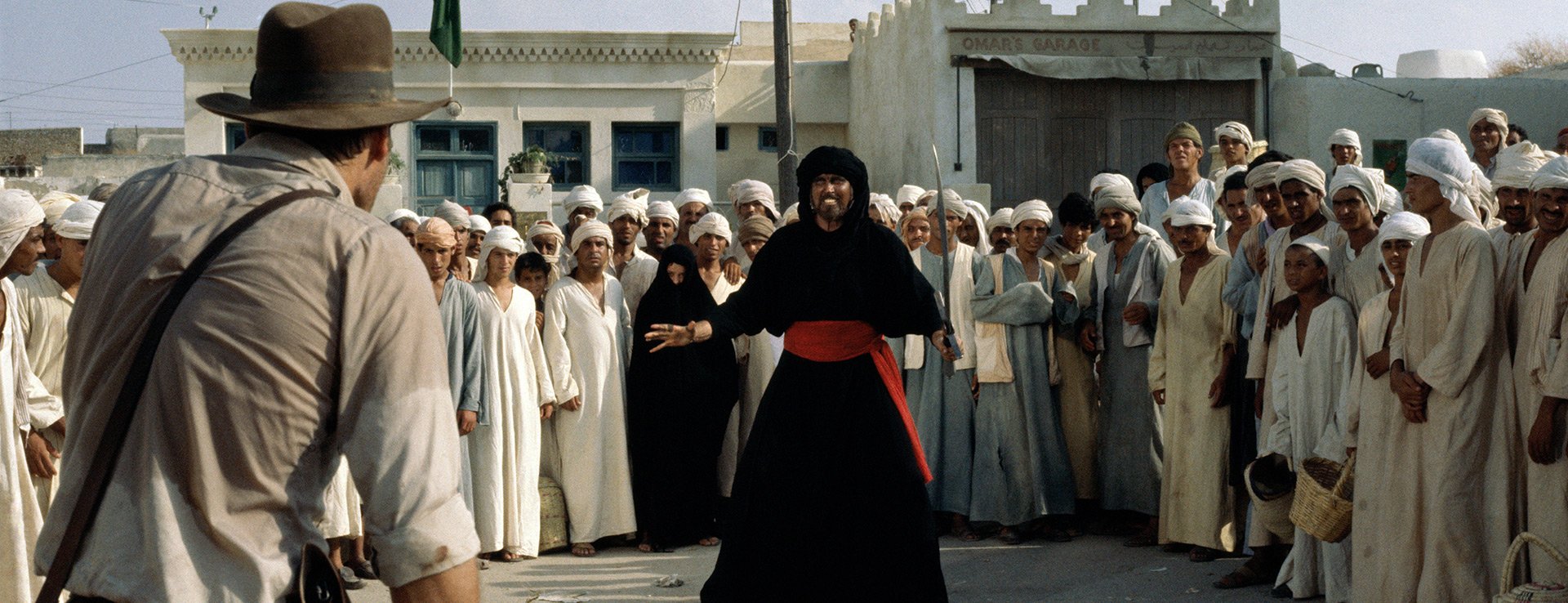Part 1: What is postcolonialism?
Author: Anastasia Pinkse
Editor: Elisah Sauerbier, Kintan van Leeuwen
In a post-colonial society, western ideology, politics and economy are still dominating factors. Western countries have the power to act independently; think of Trump who did not attend the Paris Climate Agreement or when he wanted to leave NATO as the United States was the number one donor. Institutions like the International Monetary Fund, which aims to monitor the international monetary system and create policies to help its member countries to grow and become financially stable, are based in the United States. One can only start to wonder what power the post-colonial countries have, and how they still have to oblige the decisions made by the countries from whom they thought they were finally independent. How can we loosen the chain to which post-colonial countries and developing countries are shackled, which gives them an illusion of freedom and independence and keeps them in a state of poverty and stagnation?
This article will start by defining when a country is considered to be postcolonial, followed by an explanation of what postcolonialism is and its well-known theories. ‘What is postcolonialism?’ is the first part of a series of two articles which will explore postcolonialism and the impact it has on Sri Lanka.
“The real tragedy of our postcolonial world is not that the majority of people had no say in whether or not they wanted this new world; rather, it is that the majority have not been given the tools to negotiate this new world.” — Chimamanda Ngozi Adichie
What are post-colonial countries?
To get a grasp of what postcolonialism countries are, it is wise to look at which countries are considered to be post-colonial. Europe colonized more than 80% of the world from 1493 until 1914 (Stoller-Conrad). The list of countries which were under European control is significant. These countries are divided into settler countries such as the United States, Canada and Australia, and non-settler countries such as India, Nigeria and Sri Lanka. All of the countries mentioned above could now be considered post-colonial countries, as is visible from the definition provided in dictionaries for example. According to the Collins Dictionary, postcolonial means ‘existing or occurring after a period of colonization’ (Collins Dictionary, 2022). While this definition is correct, it is rather short-sighted.
The term postcolonial is complicated, as the framework of the term is hard to define and the term can be broadly used. If we take the country of the United States for example and use the Collins Dictionary definition, it might be referred to as a postcolonial country. However, for the United States, this is not the case. In contrast, the United States rapidly became a political and economic powerhouse and in their turn displaced the native Americans. Another distinction could be made between settler colonies and non-settler colonies. The United States was a settler colony, which is a type of colony where European citizens would immigrate and start a new life. Often, these Europeans would bring their culture and customs with them and separate themselves from the natives of the particular country (Horvath, 1972, p.47). On the other hand, many countries in Asia or Africa were imperialized, meaning, these countries were dominated and exploited by Europeans but the Europeans were not permanently settled there (Horvath, 1972, p.47).
World map of Colonial Possessions in 1914
Postcolonialism in theory
Now that the establishment has been made as to which countries could be considered post-colonial, it is time to move on to what post-colonialism is. Post-colonialism, as the Collins Dictionary explained, is existing or occurring after colonization. However, post-colonialism is also a part of international relations theory. Within international relations theory, many scholars investigate and explore the different socio-economic or political states of a country or a political movement, for example. Ideas and theories by scholars from the international relations theory will be used to explain the phenomenon of post-colonialism and the current state of the post-colonial countries. Many scholars provide different theories to explain colonialism and post-colonialism, all explained through an original perspective. The scholars discussed in the following paragraphs, shape the fundamentals of international relations theory and provide key ideas on which many other scholars base their ideas.
Orientalism
A scholar who was significant for the ideas of postcolonialism within international relations theory is Edward Said, the author of the book Orientalism (1978). Orientalism was the study of eastern cultures, religions and languages in western universities. In Orientalism (1978), the author has based his conclusions on examining English literature which romanticized the Orient. In his book, Said argues that colonialism is not only a system of political rule but also a worldview where the west is seen as superior to the east. Furthermore, the author argues that the perspectives provided by scholars and writers about the Orient gave justification for imperialism and colonization. According to Said, within this literature, westerners were considered to be rational, strong and enlightened while non-Europeans were shown to be barbaric, weak and irrational. This view is reflected in this excerpt of the book: “Since the Oriental was a member of a subject race, he had to be subjected” (Said, 1978, p.207). Moreover, Said argues that this view has continued in different forms, even though the conquered east has found independence. For example, after the 9/11 attack and the Iraq War, most easterners were perceived to be terrorists by the United States and its citizens. The theory of Orientalism can explain why most post-colonial countries are still perceived as unworthy or underdeveloped as this view often still prevails.
A shot from the movie Indiana Jones: Raiders of the Lost Ark. This still is an example of Orientalism, Indiana Jones being the rational and strong man while the man in the black robe is perceived as barbaric and dangerous.
Colonialism creates a system of violence
Frantz Fanon is the author of the book The Wretched of the Earth (1961). In this book, the author theorizes that colonialism as a system represents a totalizing form of violence. According to Fanon, this is because it not only operates on the political, economical or physical level but it also includes the psychological, social and cultural destruction of the colonized through phenomena such as racism or linguistic/cultural imperialism (1961). In other words, the colonized suffered a complete form of violence which also meant the indoctrination of another culture and language, as their own culture and language were oppressed. In Fanon’s perspective, there is no possibility of political reconciliation or administration with colonialism, because it was founded on the denial of the humanity and rights of the colonized. According to Fanon, violence must be used to decolonize and is the only applicable method, as colonialism was introduced because of violence. To quote Franz Fanon: “The colonized man finds his freedom in and through violence” (Franz Fanon et al., 1961, p.86). In conclusion, Fanon argues that to eliminate colonialism and its aftermath and to create a more equal and fraternal future, revolution through violence is the only way. Fanon’s theory could explain why peaceful protests often result in violence and aggression against the oppressor.
Neo-colonialism
Neo-colonialism is a term which was coined by Kwame Nkrumah, who was an anti-colonial activist and the first president of independent Ghana in the 1960s. The former president wrote the book Neo-colonialism: The last stage of imperialism (1965). According to Nkrumah, the essence of neo-colonialism is that the state in theory is independent and has all the characteristics of international sovereignty. However, in reality, the economic system and its political policies are all directed from the outside (1965). In this book, Nkrumah was referring to circumstances where despite the independence, foreign investors and corporations owned land, mining facilities and industries. Furthermore, policies on domestic and international affairs were often dictated by outside forces, most often the colonial power that used to own them, but could also be interference by a global superpower (1965). Neo-colonialism was seen as a dominant driver for violence and impoverishment of newly independent countries.
World-System Theory
To understand the unequal balance in which postcolonial countries and their former colonies are residing, the system in which these countries operate should be explored. One of the theories which can easily explain this unequal balance is the World-System Theory of Wallerstein. According to Coccia, the world-system theory of Wallerstein is a concept of a world economy which is based on a market rather than politics (2018, p.460). It could be explained as two regions which are interdependent to gain food, natural resources or security. The world system is a multicultural territorial fragmentation of production where manufacturing and the exchange of natural resources are integrated into the lives of its inhabitants (Coccia, 2018, p.460). This fragmentation of production refers to two regions which are different from each other from a cultural perspective as well as on a geographical level. One region is focused on capital-intensive production; this region is referred to by Wallerstein as the core region. The other region is focused on labour-intensive production, which is referred to as the periphery. In between the core region and the periphery is the buffer zone which is named the semi-periphery (Coccia, 2018. P.460). According to Coccia, there is a hierarchy within the world system with the core at the top exploiting the weak and poor periphery (2018, p.460). This unequal exchange is the result of a methodical transfer of surplus from traditional sectors in the periphery to the high-technological and industrialized sectors in the core.
This theory is also able to explain why the colonizers are so dominant in world politics as they are the core countries and can exploit the postcolonial periphery countries. Interestingly, the theory of Kwame Nkrumah shares some of the key features of world system theory, as both believe that the colonizers are still able to influence the newly independent countries by their dominant positions in the system.
The model of the world-system theory of Wallerstein
Read ‘Part 2: The current state of Sri Lanka’ to learn more about the current economic crisis in Sri Lanka and how this can be explained through the theories that were mentioned above.
Little Leaders Foundation aims to bring awareness to social issues and to educate others on certain topics. Feel free to leave a comment below or suggest our next topic of research!




